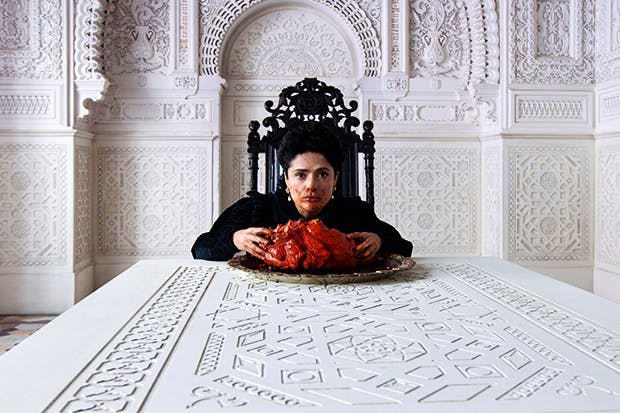Matteo Garrone’s first English-language film is a baroque fantasy based on Pentamerone (Tale of Tales), the 17th-century collection of fairy tales by the Italian poet and courtier Giambattista Basile. (It is also known as The Story of Stories, ‘Lo cunto de li cunti’, but that, I think we can all agree, travels rather less well in the original language.)
Garrone, who is best known for his grittily realistic Neapolitan crime drama Gomorrah, has thrown gritty realism entirely to the winds here. Instead, this is fantastically unhinged, veering madly between wonder and horror, gorgeousness and grotesquery, as hearts are eaten, fleas are cuddled, and an old woman’s youth and beauty are restored once she’s been suckled by a witch. (Take that, Clarins!) It’s totally of itself and out there, which is estimable, but if you generally struggle with fantasy as I do — if anything can happen by magic, why does it matter? — you may ultimately struggle with this. ‘Don’t try to understand, just feel,’ Garrone has said but if you can’t help but try to understand, because it’s your nature, that is going to interfere. (I would add that I make no apologies for this, but it wouldn’t be true; I wish it were different and keep hoping that it will be different, but it never is.)
This is based on three of the 50 stories contained in Pentamerone, otherwise known as ‘Lo cunto de li cunti’, which I will probably never tire of wheeling out, obviously. The stories are ‘The Enchanted Doe’, ‘The Flea’ and ‘The Flayed Old Woman’, which Garrone has loosely interconnected by setting them in neighbouring kingdoms. The first tale concerns a haughty queen (Salma Hayek), who is desperate for a baby and is told by a necromancer that, to become pregnant, she must eat the heart of a sea monster as cooked by a virgin. (It’s before IVF, remember.) This results in both the queen and virgin having identical albino twins overnight, which becomes troublesome when the story is taken up 16 years later, although I ask you: if the virgin had cooked the heart, as we see that she did, why, when the queen sat down to greedily devour it, was it so raw and pulsating and bloody? This is what interferes, when you are as pitifully literal as I am.
The second is about a king (the marvellous Toby Jones) who turns a flea into his beloved pet and nurtures it with hunks of steak until it’s the size of a Renault Clio (four-door), but his devotion comes at the expense of his daughter, Violet (Bebe Cave), whom he marries off to an ogre. And, lastly, it’s another king (an iffy Vincent Cassel, offering an out-of-step pantomime turn) who is lascivious and falls in love with a woman’s singing voice, assumes she’s young and beautiful — why? — and sucks her finger from beyond a keyhole. (Don’t knock it till you’ve tried it, I guess.) But the woman, Dora (Hayley Carmichael), is old, and what is known as ‘a crone’, as is her sister, Imma (the equally marvellous Shirley Henderson), with whom she lives. The king is tricked into sleeping with Dora, and not at all happy when he finds out. (This film is not kind to ‘crones’, but then who is?)
The look of Tale of Tales is eye-wateringly lavish: the sumptuous colours; the wonderful costumes; the elaborate sets; the real-life locations of glorious castles clinging to cliff tops. Also, the CGI is never too OTT. The giant flea, for example, is quite Doctor Who, circa 1971, but this gives it a reassuring sturdiness as well as a tactile quality. I wouldn’t have minded cuddling it myself, I think. But aside from the pesky matter of illogic — what hob setting did the virgin use? — there is very little to connect with here. The narrative criss-crosses between the three stories with such an abruptness it works against any engagement you might have established, plus it does not create a moral universe for itself. People live or die, get punished or go unpunished, without rhyme or reason. This may be a feature of the original stories, but it does make it extremely hard to invest in the characters, or care about their trajectories. I felt nothing.
Yes, there are visual thrills with many standout scenes — the queen devouring the heart that is cooked but not cooked; the final images of Imma in all her mad loneliness — but this is like tapas. The individual dishes are good, but you never feel as if you’ve had a proper meal. And that is all I have to say about Pentamerone, also known as …yeah, yeah.
Got something to add? Join the discussion and comment below.
Get 10 issues for just $10
Subscribe to The Spectator Australia today for the next 10 magazine issues, plus full online access, for just $10.














Comments
Don't miss out
Join the conversation with other Spectator Australia readers. Subscribe to leave a comment.
SUBSCRIBEAlready a subscriber? Log in